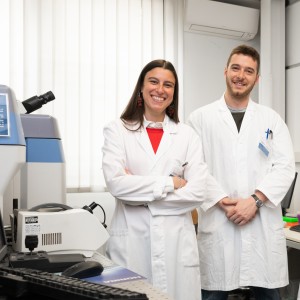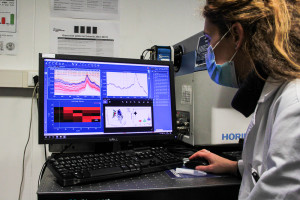IT_Version
During the last year, the Hospitals and Research Institutes of the NEVERMIND Consortium have been involved in the fight against COVID-19 pandemic.
Here we share the recent achievements of Fondazione Don Carlo Gnocchi (FDG) about a new tool for fast monitoring of the infection on saliva samples.
The “signature” of Covid-19 in patients’ saliva: a rapid, safe and not at all invasive diagnosis, thanks to an innovative technique in the clinical setting, called Raman spectroscopy. The presence of the virus is detectable even after the negative outcome of the molecular swab and the Raman result can also reveal the severity of the respiratory disease and the time elapsed since the infection.
These are the results of an important work that has involved clinicians and researchers from the IRCCS Santa Maria Nascente of FDG and the University of Milan-Bicocca. The study was conceived and coordinated by LABION – Laboratory of Nanomedicine and Clinical Biophotonics of the FDG, coordinated by Dr. Marzia Bedoni and it will be published soon in the international scientific journal “Scientific Reports” (Nature group, DOI: 10.1038 / s41598-021-84565-3).
 “At the basis of the research – explain Marzia Bedoni and Cristiano Carlomagno (researchers of FDG and first author of the study) – there is a need that is now part of the common feeling: to limit the infections and stem the spread of the pandemic; we all know the importance of quickly detecting the presence of the virus in patients. The saliva analysis method based on Raman spectroscopy is able to give a highly sensitive and specific result within a few minutes. This technique can be performed with a minimum preparation of the sample, gives results in a short time, does not require particular conditions for the execution of the measurement and is carried out without the use of reagents differently from the other test methods already in use, which require a long phase of preparation and analysis of the sample”.
“At the basis of the research – explain Marzia Bedoni and Cristiano Carlomagno (researchers of FDG and first author of the study) – there is a need that is now part of the common feeling: to limit the infections and stem the spread of the pandemic; we all know the importance of quickly detecting the presence of the virus in patients. The saliva analysis method based on Raman spectroscopy is able to give a highly sensitive and specific result within a few minutes. This technique can be performed with a minimum preparation of the sample, gives results in a short time, does not require particular conditions for the execution of the measurement and is carried out without the use of reagents differently from the other test methods already in use, which require a long phase of preparation and analysis of the sample”.
In the picture, from the left, Dr. Marzia Bedoni and Dr. Cristiano Carlomagno (LABION, FDG)
The saliva is collected thanks to a chewed swab, without any discomfort even for the elderly or for frail patients, limiting, among other things, any contact between the potentially infected subject and the healthcare worker.
The sample is then analyzed with the Raman spectroscope, an instrument that uses laser light to study the chemical composition of complex samples. The analysis identifies the presence of the virus, a “signature” that remains even after the patient has been negativized. Furthermore, by deciphering the information collected, it is possible to trace the severity of the respiratory disease and the time elapsed since the infection.
It is some years, since the researchers of the Labion have been working on the analysis of saliva as a biofluid that is easily accessible and can be collected in a non-invasive way for the patient.
The collaboration between the Don Gnocchi Foundation and the University of Milano-Bicocca (a research group directed by Professor Vincenzina Messina) has also made it possible to combine the spectroscopic analysis with complex mathematical models of classification of artificial intelligence based on machine learning and deep learning, which have allowed to differentiate infected subjects with high accuracy.
The existence of portable Raman spectroscopes on the market and the speed of this procedure have extremely significant implications, not only for the possibility of rapid diagnosis of positive Covid, but also in the monitoring of fragile patients after the disease. “The goal – the researchers conclude – is now to transfer the method defined at the laboratory level as quickly as possible into procedures that can be used in clinics or in any area where easily accessible testing of the population is required”.
To view the complete research article, click here
Carlomagno C, Bertazioli D, Gualerzi A, Picciolini S, Banfi PI, Lax A, Messina E, Navarro J, Bianchi L, Caronni A, Marenco F, Monteleone S, Arienti C, Bedoni M. COVID-19 salivary Raman fingerprint: innovative approach for the detection of current and past SARS-CoV-2 infections. Scientific Reports, 2021. DOI: 10.1038/s41598-021-84565-3
To listen the interview to Dr. Bedoni at Obiettivo Salute – Radio24, click here





